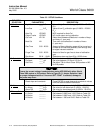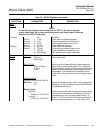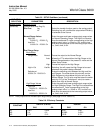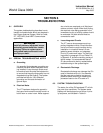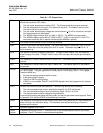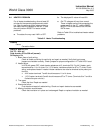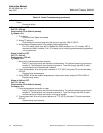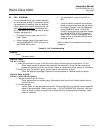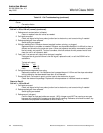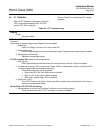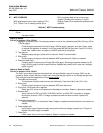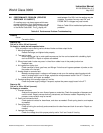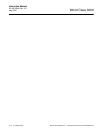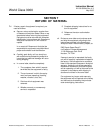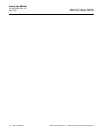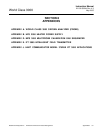
Instruction Manual
IB-106-300NH Rev. 4.3
May 2005
6-6 Troubleshooting Rosemount Analytical Inc. A Division of Emerson Process Management
World Class 3000
Table 6-3. Cell Troubleshooting (continued)
Problem
Cause
Corrective Action
Status is ResHi or CalEr.
Cell mV = -20 to 120 mV (normal) (continued).
1. Reference air contamination (oil/water).
Clean or replace lines and valves as needed.
2. Cell leads reversed.
Check cell signal wiring from probe junction box to electronics, and correct wiring if needed.
3. Reference/test gas lines reversed.
Switch piping as needed.
4. Diffusion element fault. Diffusion element cracked, broken, missing, or plugged.
Replace diffusor or snubber as needed. Diffusors are disposable because it is difficult to clean a
diffusor and know the tiny pores are open. A flow and pressure test with a manometer is possi-
ble but usually not practical. To clean a snubber, blow off surface dirt with pressurized air and
clean the unit in an ultrasonic bath.
5. Faulty cell. Low sensor cell output when test gas is applied.
If test gas flow is good and there is low cell signal, replace the cell, or call the SCAN line for
assistance.
Typical cell output:
Test Gas mV
8.0% 18 to 25
0.4% 76 to 86
6. Cell performance degraded from aging.
Replace the sensor cell if its resistance has increased beyond 1 kOhm and the slope calculated
during calibration has decreased lower than 40 mV/decade.
7. Electronics fault. Cell output is good, and the input to the electronics is good.
Check the electronics package. Replace the microprocessor or interface board as needed.
Status is Res Hi.
Cell mV = -120 to 20 mV.
1. Cell leads reversed.
Check cell signal wiring from probe junction box to electronics, and correct wiring if needed.
2. Reference/test gas lines reversed.
Switch piping as needed.
3. Reference air (nitrogen).
Confirm labels on test gas bottles are correct. 100% nitrogen must NOT be used as a zero gas
because cell protection will engage and affect the O
2
reading. Reference air should be clean, dry
instrument air prepared from ambient air with 20.95% O
2
.



